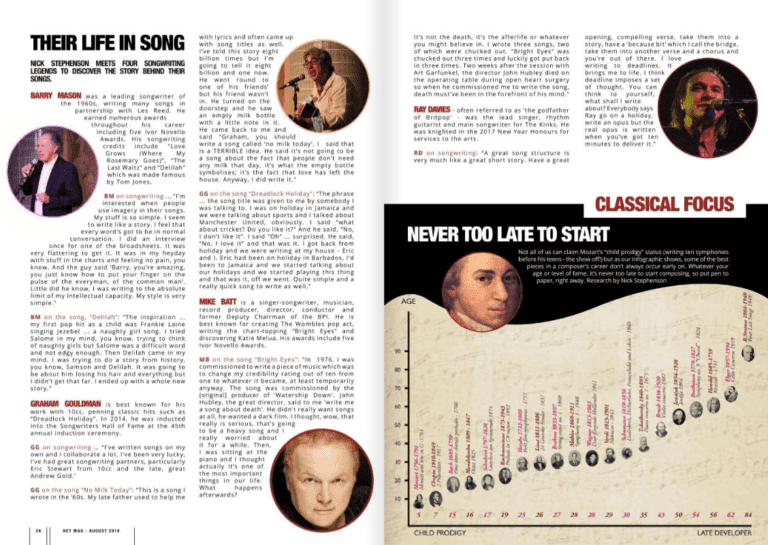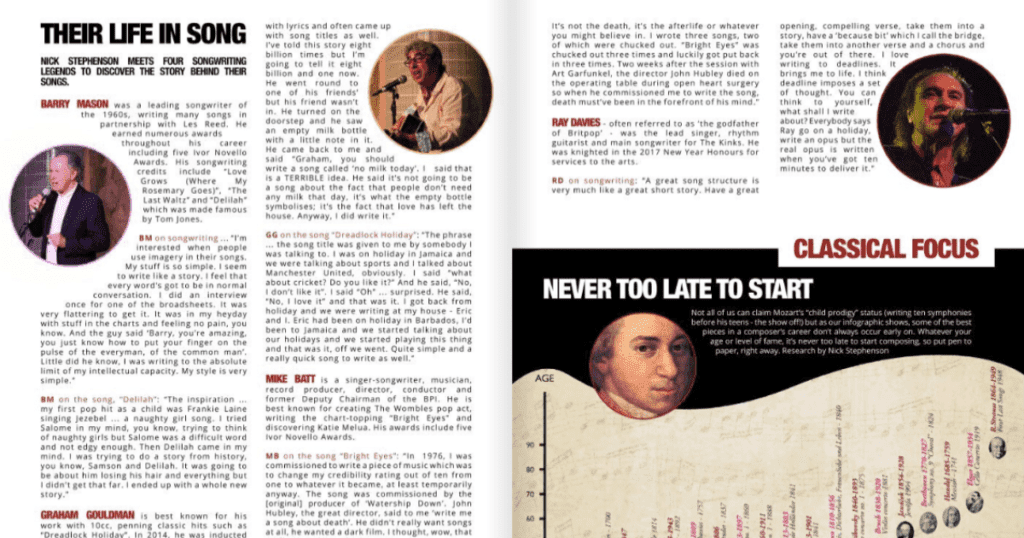
Nick Stephenson meets four songwriting legends to discover the story behind their songs.
BARRY MASON was a leading songwriter of the 1960s, writing many songs in partnership with Les Reed. He earned numerous awards throughout his career including five Ivor Novello Awards. His songwriting credits include “Love Grows (Where My Rosemary Goes)”, “The Last Waltz” and “Delilah” which was made famous by Tom Jones.
BM on songwriting … “I’m interested when people use imagery in their songs. My stuff is so simple. I seem to write like a story. I feel that every word’s got to be in normal conversation. I did an interview once for one of the broadsheets. It was very flattering to get it. It was in my heyday with stuff in the charts and feeling no pain, you know. And the guy said ‘Barry, you’re amazing, you just know how to put your finger on the pulse of the everyman, of the common man’. Little did he know, I was writing to the absolute limit of my intellectual capacity. My style is very simple.”
BM on the song, “Delilah”: “The inspiration … my first pop hit as a child was Frankie Laine singing Jezebel … a naughty girl song. I tried Salome in my mind, you know, trying to think of naughty girls but Salome was a difficult word and not edgy enough. Then Delilah can in my mind. I was trying to do a story from history, you know, Samson and Delilah. It was going to be about him losing his hair and everything but I didn’t get that far. I ended up with a whole new story.”
GRAHAM GOULDMAN is best known for his work with 10cc, penning classic hits such as “Dreadlock Holiday”. In 2014, he was inducted into the Songwriters Hall of Fame at the 45th annual induction ceremony.
GG on songwriting … “I’ve written songs on my own and I collaborate a lot. I’ve been very lucky, I’ve had great songwriting partners, particularly Eric Stewart from 10cc and the late, great Andrew Gold.”
GG on the song “No Milk Today”: This is a song I wrote in the ’60s. My late father used to help me with lyrics and often up up with sing titles as well. I’ve told this story eight billion times but I’m going to tell it eight billion and one now. He went round to his friends’ but he friend wasn’t in. He turned on the doorstep and he saw an empty milk bottle with a little note in it. He came back to me and said ‘Graham, you should write a song called ‘no milk today’. I said that is a TERRIBLE idea. He said it’s not going to be a song about the fact that people don’t need any milk that day, it’s what the empty bottle symbolises; it’s the fact that love has left the house. Anyway, I did write it.”
GG on the song “Dreadlock Holiday”: “The phrase … the song title was given to me by somebody I was talking to. I was on holiday in Jamaica and we were talking about sports and I talked about Manchester United, obviously. I said “what about cricket? Do you like it? And he said “No, I don’t like it”. I said “Oh” … surprised, He said “No, I love it” and that was it. I got back from holiday and we were writing at my house – Eric and I. Eric had been on holiday in Barbados, I’d been to Jamaica and we started talking about our holidays and we started playing this thing and that was it, off we went. Quite simple and a really quick song to write as well.”
MIKE BATT is a singer-songwriter, musician, record producer, director, conductor and former Deputy Chairman of the BPI. He is best known for creating The Wombles pop act, writing the chart-topping “Bright Eyes” and discovering Katie Melua. His awards include five Ivor Novello Awards.
MB on the song “Bright Eyes”: “In 1976, I was commissioned to write a piece of music was was to change my credibility rating out of ten from one to whatever it became, at least temporarily anyway. The song was commissioned by the [original] producer of ‘Watership Down’. John Hubley, the great director, said to me ‘write me a song about death’. He didn’t really want songs at all, he wanted a dark film. I thought, wow, that really is serious, that’s going to be a heavy song and I really worried about it for a while. Then, I was sitting at the piano and I thought actually it’s one of the most important things in our life. What happens afterwards? It’s not the death, it’s the afterlife or whatever you might believe in. I wrote three songs, two of which were chucked out. “Bright Eyes” was chucked out three times. Two weeks after the session with Art Garfunkel, the director John Hubley died on the operating table during open heart surgery so when he commissioned me to write the song, death must’ve been in the forefront of his mind.”
RAY DAVIES – often referred to as the ‘godfather of Britpop’ – was the lead singer, rhythm guitarist and main songwriter for The Kinks. He was knighted in the 2017 New Year Honours for services to the arts.
RD on songwriting: “A great song structure is very much like a great short story. Have a great opening, compelling verse, take them into a story, have a ‘because bit’ which I call the bridge, take them into another verse and a chorus and you’re out of there. I love writing to deadlines. It brings me to life. I think deadline imposes a set of thought. You can think to yourself, what shall I write about? Everybody says Ray go on a holiday, write an opus but the real opus is written when you’ve got ten minutes to deliver it.”
